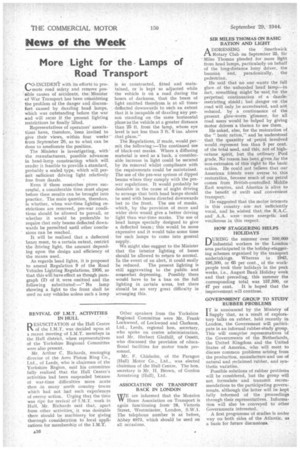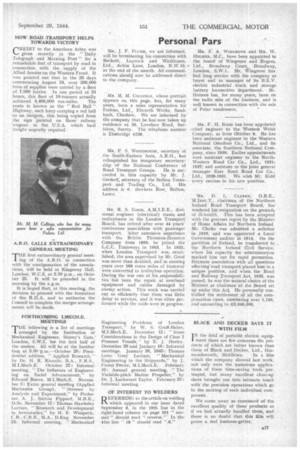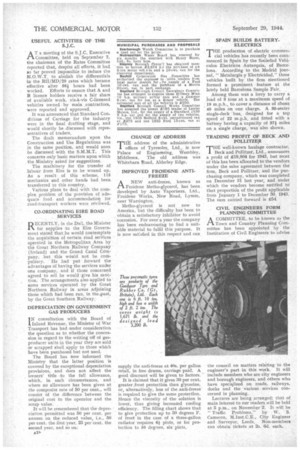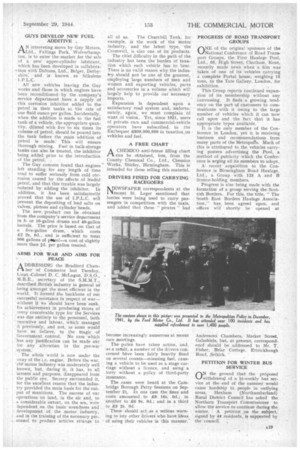News of the Week More Light for the Lamps of Road Transport
Page 18

Page 19

Page 20

Page 21

If you've noticed an error in this article please click here to report it so we can fix it.
C0lis■-CIDEN'i with its efforts to pro-. .mote road safety and remove possible causes of aecidents, the Minister of War Transport has been considering the problem of the danger and discomfort caused by dazzling head lamps, which was outstanding before the war and will recur if the present lighting restrictions be finally lifted.
Representatives of operators' associations have, therefore, been invited to give their views, within four weeks from September 20, as to what can be done to ameliorate the position.
The Minister is investigating, with the manufacturers, possible advances in head-lamp construction which will. render it feasible to provide a standard, probably a sealed type, which will permit sufficient driving light relatively free from dazzle.
Even if these researches prove successful, a considerable time must elapse before their results can be brought into practice. The main question, therefore, is whether, when war-time lighting restrictions are removed, pre-war conditions should be allowed to prevail, or whether it would be preferable to • require that only beams deflected downwards be permitted until other conclusions can be reached.
It will be realized that a deflected beam must, to a certain extent, restrict the 'driving light, the amount depending upon the design and efficiency of the means used.
As regards head lights, it is proposed to amend Regulation 9 of the Road Vehicles Lighting Regulations, 1936, so that this will have effect as though paragraph (2) of it were omitted and the following substituted:—" No lamp showing a light to the front shall be used on any vehicles unless such a lamp is so constructed, fitted and maintained, or is kept so adjusted while the vehicle is on a road during the hours of darkness, that the beam of light emitted therefrom is at all times deflected downwards to such an extent that it is incapable of dazzling any person standing on the same horizontalplane as the vehicle at a greater distance than 25 ft. from the lamp, whose eye level is not less than 3 ft..6 ins. above 1.13at plane."
The Regulations, if made, would permit the following :—The continued use of black-out masks. Where a diffusing material is used as a back, considerable increase in light could be secured by its removal whilst compliance with the requirements • could be maintained. The use of the pre-war system of dipped beams where they comply with the prewar regulations. It would probably be desirable in the cause of night driving to arrange that both head lamps should be used with beams directed downwards but to the front. The use of masks, which, by theprovision of more and wider slots would give a better driving light than war-time masks. The use of head lamps specially designed to give a deflected beam ; this would be more expensive and it would take some time for such lamps to come into general supply.
We might also suggest to the Minister that the interior lighting of buses should be allowed to return to normal. In the event of an alert, it could easily be reduced. The present lighting is still aggravating to the public and sonaewhat depressing. Possibly there would have to be a ban on the full lighting in certain areas, but there should be no very great difficulty in arranging this.
SIR MILES THOMAS ON BASIC RATION AND LIGHT
ADDRESSING the Smethwick Rotary Club on September 25, Sir Miles Thomas pleaded for more light from head lamps, particularly on behalf of the long-distance lorry driver, the busman and, paradoxically, the pedestrian.
He said that no one wants the full glare of. the unhooded head lamp—in fact, something might be said for the perpetual continuation of a dazzlerestricting, shield; but danger on the road will only be accentuated, and not reduced, by a continuance of the present glow-worm 'glimmer, for all road users would be helped by giving motor drivers a chance to see them.
He asked, also, for the restoration of the " basic ration," and he understood that the quantity of petrol involved would represent less than 5 per cent. of the total used, and this, not of highoctane spirit, but the ordinary Pool grade, No reason has been, given for the non-extension of this right to the basic ration. He could not believe that our American friends were averse to this restoration, because much of our petrol comes from British-controlled Middle East sources, and America is alive to the benefit of swift and convenient transport.
He suggested that the motor interests in this country. are not sufficiently vocal, and he. wished that.the R.A.C. and A.A. were more energetic and vociferous in this respect.
HOW STAGGERING HELPS HOLIDAYS
DURING the summer over 500,000 industrial workers in the London area participated in the holiday-staggering schemes organized by the transport undertakings. Whereas in 1943, 196,300, or 65 per cent., of the workpeople took their holidais in the peak weeks, i.e., August Bank Holiday week and that preceding, this summer the corresponding total was 157,300, or 47 per cent. It is hoped that the imprOvement will continue.
GOVERNMENT GROUP TO STUDY RUBBER PROBLEMS
TT is announced by the Ministry of 1 Supply that, as a result of exploratory talks on rubber, held recently in London, the Government will participate in an informal rubber-study group. This will comprise representatives of the Governments of the Netherlands, the United Kingdom and the United States of America, who will meet to discuss common problems arising from the production, manufacture-and use of natural and reclaimed rubber, and synthetic varieties.
Possible solutions of rubber problems will be considered, but the group will not formulate and transmit recommendations to the participating governments, although the latter will be kept fully informed of the proceedings through their representatives. Information will also be conveyed to other Governments interested.
A first programme of studies is under way on both sides of the Atlantic, as a basis for future discussions.
HOW ROAD TRANSPORT HELPS TOWARDS VICTORY
CREDIT to the American Army was given recently in the " Daily Telegraph and Morning • Post" for a remarkable feat of transport by road in connection with the supply of the Allied Armies on the Western Front. It was pointed out that in the 26 days commencing August 24, over 200,000 tons of supplies were carried by a fleet of 7,000 lorries. In one period of 24 hours, this fleet of 10-tonners actually
achieved 4,400,000 ton-miles. The route is known as the " Red Ball " Highway, each lorry carrying a red ball as an insignia, this being copied from the sign painted on those railway 'wagons in the U.S.A. which haul freight urgently required.
A.R.O. CALLS EXTRAORDINARY GENERAL MEETING
THE first extraordinary general meeting of the A.R.O. in connection with the amalgamation of the associations, will be held at Kingsway Hall, London, W.C.2, at 2.30 p.m., on Octotier 25. It will be preceded in the morning by the a.g.m.
It is hoped that, at this meeting, the decision to proceed with the formation of the R.H.A. and to authorize the Council to complete the merger arrangements will be made.
FORTHCOMING LMECH.E. MEETINGS .
THE following is a list of meetings arranged by the Institution of Mechanical Engineers, Storey's Gate.' London, S.W.1, for the first half of the session. All will be at the Institution at 5.30 -p.m.—October 20: Presidential address, " Applied Research,"by Dr. H. R. Ricardo, B.A., y.R.S., M.I.Mech.4. October 27: Informal meeting, "The Influence of Engineering on Social Advancement," by Edward Reeve, M.1.Mech.E. November 3: Extra general meeting (Applied Mechanics Group), " Stresses by Analysis and Experiment," by Professor A. J. Sutton Pippard, M.B.E., D.Sc. November 17: Thomas Hawksley Lecture, " Research and Development in Aeronautics," by H. E. Wimperis, CB., C.B.E., M.A., D.Eng. November 24: Informal meeting, " Mechanical' Engineering Problems of London Transport," by W. S. Graff-Baker, M.I.Mech.E. December 15: "Some Considerations in the Design of Class 1 Pressure Vessels," by E. J. Heeley. December 29 and January 19: Informal meetings. January 26, 1945: Thomas Lowe ' Gray Lecture, " Mechanical Engineering in the Shipyards," by J. Foster Petree, M.I.Mech.E. February 16: Annual general meeting, "The Variable-pitch Marine Propeller," by Dr. J. Lockwood Taylor. February 23: Informal !fleeting.
OF INTEREST TO WELDERS
REFERRING to the article on welding which appeared in our issue dated September 8, in the 19th line in the right-hand column on page 101 " normal " should read '! reverse." In the 41st line ".16 " should read ".6."
BLACK AND DECKER SAYS IT WITH FILM I N the field of portable electric equipment there are few concerns the products of which are better known than those of Black and Decker, Ltd., Har mondsworth, Middlesex. In a film which the company showed last week, not only were the numerous applications of these time-saving tools portrayed, but many excellent close-up shots brought one into intimate touch with the precision operations which go to the making of each individual component.
We came away as convinced of the excellent quality of these products as if we had actually handled them, and there is no doubt that this film will prove a real business-getter. USEFUL ACTIVITIES OF THE S.J.C.
'AT a meeting of the S.J.C. Executive Committee, held on September 7, the chairman of the Rates Committee reported that, despite all efforts, it had so far proved impossible to induce the M.O.W.T, to abolish the differentials in the RH/MD/20 rates which became effective after 56f hours had been worked. Efforts to ensure that A and B licence holders receive a fair share of available work, vis-i-vis C-licensed vehicles owned • by main contractors, were reported and approved.
It was announced that Standard Con. ditions of Carriage for the industry were in the final drafting stage, and would shortly be discussed with representatives of traders.
The draft memorandum upon the Construction and Use Regulations was in the same position, and would soon be discussed with the S.M.M.T. This concerns only basic matters upon which the Ministry asked for suggestions.
The machinery for the transfer of labour from Eire is to be wound up. As a result of this scheme, 115 mechanics and other hands had been transferred to this country.
Various plans to deal with the complex problem of the provision of ade-, quate food and accommodation for road-transport workers were reviewed.
CO-ORDINATING EIRE ROAD SERVICES
RECENTLY, in the Dail, the Minister for supplies to the Eire Government stated that_he would contemplate the acquisition of certain road services operated in the Metropolitan Area by the Great Northern Railway Company (Ireland) and the Grand Canal Ccimpany, but this would not be compulsory. He had put forward the advantages of having the services under one company, and if those concerned agreed to sell he would -give his sanction. The arrangements also applied to some services operated by the Great Northern Railway in areas adjoining those which had been run, in the.past, by the Great Southern Railway.
DEPRECIATION ON GOVERNMENT GAS PRODUCERS
IN consultation with the Board of
Inland ReVenue, the Minister of War Transport has had-under consideration the question as to whether the concession in regard to the writing off of gasproducer units in the year they are sold ar scrapped shall apply to those which have been purchased but not used.
The Board has now informed the Ministry that the latter position is covered by the exceptional depreciation provisions, and does not affect the Owners' title to the full allowance, which, in such circumstances, and where no allowance has been given at the composite rate of 50 per cent., will consist of the difference between the original cost to the operator and the scrap value.
It will be remembered that the depreciation permitted was 50 per cent, per annum on the reduced value, i.e., 50 per cent. the first year, 25 per cent, the second year, and so on: CHANGE OF ADDRESS
THE address of the administrative offices of Tyresoles, Ltd., is now Palace of Engineering, Wembley, Middlesex. The old address was Whitebarn Road, Alderley Edge.
IMPROVED FROIDENE ANTIFREEZE ANEW anti-freeze, known as Froidene Metho-glycerol, has been developed by Auto Vaporisers, Ltd., Froidene Works, New Road, Lymm, near Warrington.
Metho-glycerol is not new to America, but the difficulty has been to obtain a satisfactory inhibitor to avoid corrosion. For over a year the company has been endeavouring to find a suitable material to fulfil this purpose. It is now satisfied in this respect and can
supply the anti-freeze at 40s. per gallon retail, in free drums, carriage paid'. A good discount will be given to factors.
It is claimed that it gives 30 per cent. greater ,frost protection than glycerine, or, alternatively, less of the anti-freeze is required to give the same protection. Hence the viscosity of the solution is lower, thus giving increased cooling efficiency. The filling chart shows that to give protection up to 30 degrees F. of frost in the case of a three-gallon radiator requires 4 pints, or for protection to 50 degrees, six pints.
SPAIN BUILDS BATTERYELECTRICS THE production of electric commetcial vehicles has recently been commenced in Spain by the Sociedad Vehiculos Electricos Autarquia, of Barcelona. According to the Madrid journal, " Metalurgia y Electricidad," three vehicles built by the firm mentioned formed aprominent feature at the lately held Barcelona Sample Fair.
Among them was a lorry to carry a load of 3 tons at a maximum speed of 19 to cover a distance of a'bout 40 miles on one charge. A 30-seater single-deck bus, designed for a top speed of 22 m.p.h. and fitted with a battery having a capacity of 37f miles on a single charge, was also shown.
TRADING PROFIT OF BECK AND POLLITZER
THE well-known haulage contractor, Beck and Pollitzer, Ltd., announces a profit of £19,804 for 1943, but most of this has been allocated to the vendors under the sales agreement between the firm, Beck and Pollitzer, and the purchasing company, which was completed on December 31 last year, and under which the vendors become entitled to' that proportion of the profit applicable from January I to December 30, 1943. The sum carried forward is £54.
CIVIL ENGINEERS FORM PLANNING COMMITTEE
ACOMMITTEE, to be known as the Town and Country Planning Committee has been appointed by the Institution of Civil Engineers to advise the council on matters relating to the engineer's part in this work. It will include members who are city engineers and borough engineers, and others who have specialized on roads, railways, docks and the various services concerned in planning.
Lectures are being arranged; that of main interest to our readers will be held at 5 p.m., on November 2. It will be " Traffic Problems," by W. S. Cameron, M.Inst.C.E., City Engineer and Surveyor, Leeds. Non-members can obtain :tickets at 2s. 6d. each. GUYS DEVELOP NEW FUEL ADDITIVE •
A N interesting move by Guy Motors, Fallings Park, Wolverhampton, is to enter the market for the sale of a new upper-cylinder lubricant, which has been developed in collaborai tion with Daltons, Ltd., Belper, Derbyshire; and is known as Silkolene I.P.L.C.
All new vehicles leaviug the Guy works and those in which engines have been reconditioned -by the company's service department have a supply of this corrosion inhibitor added to the petrol in their tanks at 'the rate of one fluid ounce per gallon. Incidentally, when the addition is made to the fuel tank of a vehicle, the appropriate quantity, diluted with five to six times its volume of petrol, Should be poured into the tank before the main addition of petrol is made: This will ensure thorough mixing. Fuel in bulk-storage tanks can also be treated, the inhibitor being added prior to the introduction of The petrol.
The Guy concern found that engines left standing for any length of time tend to suffer seriously from cold corrosion caused by the effects of leaded petrol, and that this trouble was largely reduced by adding the inhibitor. In addition, it has been satisfactorily oroved that the use of I.P.L.C. will prevent the depositing of lead salts on valves, pistons and cylinder heads. The new product can be obtained from the company's service department in 5or 10-gallon drums and 40-gallon barrels. The price is based on that of a five-gallon drum, which costs £2 2s. 6d., and is sufficient to treat 800 gallons of plisrol—a cost of slightly more than Id. per gallon treated.
ARMS FOR WAR AND AIMS FOR PEACE
A DDRESSING the Bradford Cham ber of Commerce last Tuesday, Lieut.-Colonel D. C. McLagan, D.S.O., M.B.E., secretary of the S.M.M.T., described British industry in general as' being amongst the most efficient in the world. It formed the backbone of our successful resistance in respect of war— without it we should have been sunk. Its achievement in producing stores of every conceivable type for the Services was due entirely to the personnel, both
• !xecutive and labour, which managed it previously, and not, as some would have us believe, to the magic of Government control. No case which has any justification can be made out for any alteration in the pre-war system.
The whole world is now under the sway of the i.c. engine. Before the war, the motor industry was moderately well known, but, during it, it has, to all intents and purposes, disappeared from the public eye. Secrecy surrounded it, for the excellent reason that the industry provided the main basis for the output of munitions. The success of our operations on land, in the air and, to a considerable extent, on the sea, were lependent on the basic soundness and development. of the motor industry, and in the training of the necessary personnel to produce articles strange to
all of us. The Churchill Tank, for
example, is the work of the -motor industry, and the latest type, the Cromwell, is also one of its products.
The chief difficulty in the path of the industry has been the burden of taxation which each vehicle has to bear. There is no valid reason why the industry should not be one of the greatest, employing large numbers of men and women and exporting vehicles, parts and accessories in a volume which will largely help to provide our necessary imports.
Expansion is dependent upon a satisfactory road system and, anfortu-' nately, again, we must complain of want of vision, Vet, since 1921, users of private cars and commercial-vehicle operators have subscribed to the Exchequer £800,000,000 in taxation_on vehicles and fuel.
A FREE CHART
ACHEMICO anti-freeze filling chart can be obtained, free, from the County Chemical Co., Ltd., Chemico Works, Shirley, Birmingham. This is intended for those selling this material.
DRIVERS FINED FOR CARRYING RACEGOERS
NEWSPAPER correspondents at the recent St. Leger mentioned that lorries were being used to carry passengers in competition with the taxis, and added that these " pirates " had
become increasingly numerous at recent race meetings.
The police have taken action, and, as a result, a number of the drivers concerned have been fairly heavily fined on several counts—misusing fuel, causing a vehicle to be used as a stage carriage without a licence, and using a . lorry without a policy of third-party insurance.
The cases were heard at the Cambridge Borough Petty Sessions on September 21; In one case the fines and costs amounted to 18 16s. Od.; in another to £6 9s. 9d.; and in a third to £3 2s. Od.
These should act as a serious warning to any other drivers who have ideas • of using their vehicles in this manner." PROGRESS OF ROAD TRANSPORT GROUPS
ONE of the original sponsors of the National Conference of Road Trans-port Groups, the First Haulage Pool, Ltd., 95, High Street, Chatham, Kent, recently made news when a film was taken of one of its vehicles carrying a complete Portal house, weighing 15 tons, to the Tate Gallery, London, for exhibition.
This Group reports continued expansion of its membership without any canvassing. It finds a growing tendency on the part of customers to communicate with it owing to the large number of vehicles which it can now call upon and the fact that it has appropriate types available. '
It is the only member of the Conference in London, yet it is receiving business and recommendations from many parts of the MetropolTs. Much of this is attributed to the vehicles carrying posters advertising the Pool, a method of publicity which the Conference is urging all its members to adopt.
A recent acquisition to the Conference is Birmingham Road Haulage, Ltd., a Group with 123 A and B -licence-holding members.
Progress is also being made with the formation of a group serving the Scottish Borders. For this, the title, " The South East Borders Haulage Association," has been agreed upon, and -offices will shortly be opened at Andersons Chambers, Market Street, Galashiels, but, at present, correspond,ence should be addressed to Mr. T. Fisher, Briar Cottage, Ettrickhaugh Road, Selkirk. •
PETITION FOR WINTER BUS SERVICE
Othe ground that the proposed withdrawal of a bi-weekly bus service at the end of the summer would cause hardship to people in outlying areas, Hexham (Northumberland) Rural District Council has asked the Northern Transport Commissioner to allow the service to continue during the winter. A petition on the subject, signed by 94 residents, is supported by the council. ,




















































